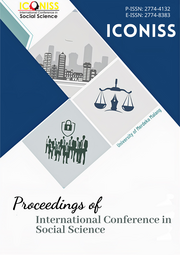The Effectiveness of Setting, Management, Guidance, and Control for Street Vendors Based on Blitar City Mayor Regulation Number 43 Year 2018
DOI:
https://doi.org/10.26905/iconiss.v3i1.9087Keywords:
Guidance and Control for Street Vendors, Mayor Regulation, Street Vendors, Setting, ManagementAbstract
The hope for a healthy and sustainable environment in the future is a concern. The rapid development of development has an impact on the utilization and management of the environment. Through sustainable development, it is hoped that the use and management of the environment can meet the needs of the present generation without compromising the right to fulfillment needs of future generations. Street vendors are defined as people who peddle goods and services for sale in places that are public spaces, especially on roadsides and sidewalks. Street vendors who are not organized cause the pattern and structure of the city to become disorderly and orderly. Dualistic physical appearance is mushrooming in all urban spaces, especially in the functional areas of the city which are the center of economic activity. The government in the rule of law is allowed to carry out various kinds of efforts to fulfill community welfare as well as environmental sustainability through regulatory instruments that are intended to organize, control and foster street vendors which have implications for optimizing Green Open Space and restoring the function of river borders.
Downloads
References
Blitar City Industry and Trade Office. (2021). Final Report on Potential Study and Structuring PK5 Blitar City.
Rahman, Abd. (2021). Strategi Pemerintah Daerah Dalam Penataan PKL di Pantai Losari Kota Makassar (Studi Kasus Car Free Day). Thesis. Master of Public Administration Science.
Sadhana, K. (2011). Realitas Kebijakan Publik. Malang: Penerbit Universitas Negeri Malang.
Alisjahbana, B. (2003). Urban Hidden Economy-Peran Tersembunyi Sektor Informal Perkotaan. Surabaya: Lembaga Penelitian ITS.
Oktaviana, H. (2006). Konsep Penataan Pedagang Kaki Lima (PKL) Berdasarkan Karakteristik Kegiatan dan Fisik Studi Kasus: Kawasan Ampel Surabaya. Surabaya: ITS Library.
Resty, A. S. (2010). Arah Penetapan PKL Center di wilayah Surabaya Barat berdasarkan preferensi PKL, konsumen dan regulator Sepuluh November Surabaya. Institute of Technology Surabaya.
Hidayah, K., & Rengga, A. (2015). Pengaturan dan Pembinaan Pedagang Kaki Lima Menurut Peraturan Daerah Kota Semarang Nomor 11 Tahun 2000 Di Kawasan Simpang Lima Kota Semarang. Journal of Public Policy and Management Review, 5(1), 1-10.
Miranti, A., & Lituhayu, D. (2012). Evaluasi Program Penataan Pedagang Kaki Lima di Kabupaten Tegal. Journal of Public Policy and Management Review, 1(1), 61-70.
Nurhadi, W. (2019). Evaluasi Kebijakan Penataan PKL di Kota Tasikmalaya Tahun 2016-2017 (Studi Kasus Peraturan Walikota Nomor 60 Tahun 2015 Tentang Penataan PKL di Bagian Jalan Cihideung).
Downloads
Published
Issue
Section
License
Authors who publish in this journal agree to the following terms:
(1)Â Copyright of the published articles will be transferred to the journal as the publisher of the manuscripts. Therefore, the author confirms that the copyright has been managed by the journal.
(2) Publisher of Proceedings of International Conference in Social Science is the University of Merdeka Malang.
(3) The copyright follows Creative Commons Attribution–ShareAlike License (CC BY SA): This license allows to Share — copy and redistribute the material in any medium or format, Adapt — remix, transform, and build upon the material, for any purpose, even commercially.

